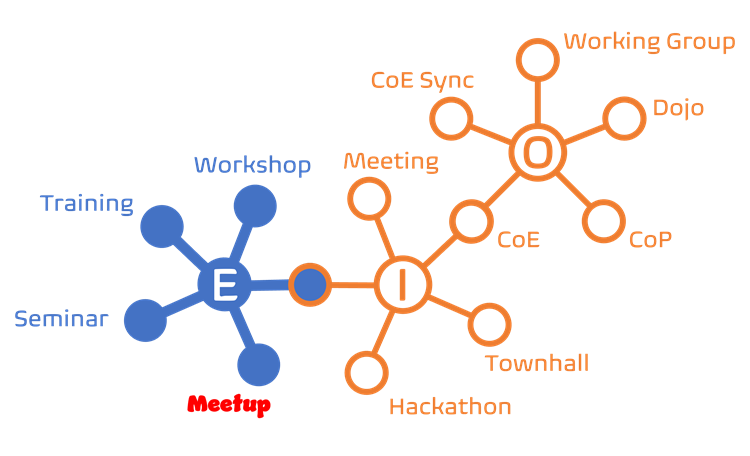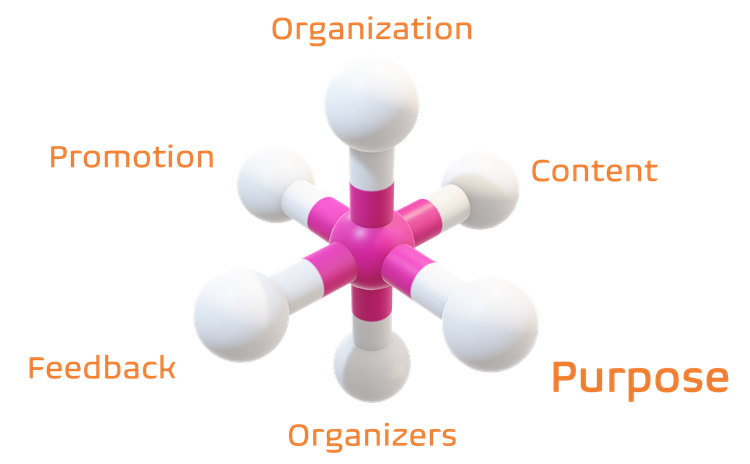We are committed to managing several internal initiatives, including hackathons, town halls, and Centers of Enablement (CoE) that further inspire the formation of Communities of Practice (CoP), dojos, and working committees. Additionally, we orchestrate and enjoy external engagements like workshops, training sessions, seminars, and networking events, such as our DevOps Vancouver Meetup.
You can review Ceremony Overview for more insight into the internal ceremonies - in this post I will focus on the takeaways from hosting public meetups.
A meetup is a casual event where individuals with shared interests like DevOps come together to mingle, exchange ideas, connect, or participate in related activities. The term "meetup" gained prominence with Meetup.com, a site that facilitates the organization and discovery of such events.
But first, why are these events pivotal?
Events such as technical meetups and communities of practice (CoP) are essential for:
- Best Practices and Standards - They aid in setting and spreading industry benchmarks. Our centers of enablement (CoE), for example, Provide guardrails (aka governance).
What is a guardrail? A guardrail is likened to the safety barriers on a bridge, serving as a metaphor to guide our engineers in safely and efficiently using our software development lifecycle (SDLC). It represents our commitment to setting standards and governance in a way that empowers rather than dictates. Our team promotes engineering practices and while engineers can disregard these 'guardrails,' doing so often leads to a higher chance of issues, with less support available.
- Community Building - They cultivate a sense of community and improve job satisfaction.
- Feedback and Improvement - Offers a chance for critique and improvement of work.
- Innovation - Exposure to diverse thoughts encourages innovative thinking.
- Inspiration and Motivation - Witnessing peers' achievements can stimulate personal drive.
- Knowledge Sharing - They promote ideas, experiences, and industry trends exchange.
- Networking Opportunities - They help build connections with colleagues and leaders.
- Problem Solving - They offer venues for tackling challenges collaboratively.
- Skill Development - Dojos, workshops and presentations facilitate learning and skill enhancement.
- Visibility and Recognition - Participation raises profile and might create leadership chances.
Our events contribute to continuous professional development, continuous learning, and collective progress.
What is the catch?
Although there are several challenges, typically the advantages of collaboration events surpass issues, such as:
- Cost - Event planning can incur high expenses, including venue rental, catering, advertising, and speaker honorariums.
- Logistics - Arranging the event specifics, such as location, date, time, can be intricate and time-consuming.
- Low Attendance - A successful event often depends on a high turnout for effective networking, promotion, and value for hosts and speakers.
- Risk Management - It is critical to plan for unexpected issues like cancellations, poor attendance, or emergencies.
- The Inevitable One - Handling that one attendee who comes just for the free food or to create continuous interruptions is a known challenge.
Back to the core topic - our learnings!
For a meetup to be effective, we've realized the importance of these six key components:
- Purpose – It is critical to define the purpose and desired results for your meetup, providing clear answers to "what will I gain from this and why should I spend my valuable time attending?"
LEARNING 1 - Purpose is the most important ingredient to cook up a successful event!
- Engaging Content - Present exciting and pertinent material to keep participants involved and provide value.
LEARNING 2 - Minimize text and slides for a better presentation; maximize demonstrations and involve the audience more.
- Organization - It is crucial to meticulously plan everything from choosing a suitable venue to organizing and handling logistics efficiently.
LEARNING 3 - Post-pandemic findings indicate that in-person gatherings draw larger crowds compared to online events, with about 70% attendance for face-to-face meetings against roughly 50% for virtual ones, compared to RSVPs (Répondez s'il vous plait). Additionally, incorporating a live stream into your physical event might lead to a decrease in attendance since potential participants may opt to stay home at the last minute and view it online instead.
- Promotion - Effective advertising is key to drawing in attendees, and clear communication keeps all parties informed.
- Feedback Loop - It is crucial to collect and utilize feedback from participants to enhance future events and meet community expectations.
LEARNING 4 - We have observed that the response rate to surveys after meetups is quite low, less than 20%. The best method to obtain feedback about the session and meetup seems to be collecting it in real-time. I find it engaging when the speaker incorporates an interactive poll during their talk, like using Mentimeter.
- Committed Leadership - Having eager and passionate coordinators is essential for addressing unexpected challenges and making sure that the event runs smoothly.
What have you learned from your meetups?



